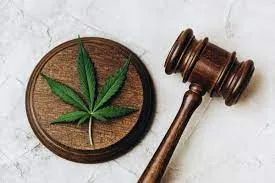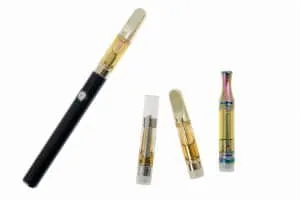Delta 9 THC is the more technical name we know of THC. While on the other hand, THCa is the precursor to THC and is federally legal. Without THCa, it is not possible to get high. Without decarbing it and on its own, THCa cannot get you high.
In this article, we will talk about the differences between THCa and Delta 9, which are the most crucial cannabis compounds. We will also tell you about their benefits, potential side effects, consumption, etc.
Sections
ToggleWhat is THCa?

THCa is the actual cannabinoid present in the cannabis plant. Tetrahydrocannabinolic acid or THCa is the non-psychoactive precursor to Delta 9 THC. It is the raw form of THC. THCa is there in abundance in raw, fresh cannabis and doesn’t get high as per its own nature.
But when you apply heat to it, like if you are vaping or smoking, then it undergoes the process of decarboxylation, thus converting it into psychoactive Delta 9 THC.
How THCa is found in Raw Cannabis?
THC is the cannabinoid in live and raw cannabis plants and is the acidic form of THC, non-psychoactive in the natural state. The cannabis plant does not create THC; it creates the compounds that become psychoactive when the right conditions are met.
What is Delta 9 THC?

Delta 9 THC is the cannabinoid that most cannabis users know about. It is the compound that offers a “high” feeling associated with weed when it interacts with the body’s endocannabinoid system, mainly with BC1 receptors in one’s brain.
Psychoactive Effects and Interaction with the Body
Though Delta 9 is indeed non-psychoactive in smaller amounts, some recent studies show that it can result in psychoactive effects in the case of some people. This is so because Delta 9 can even interact with CB1 receptors, which can further result in the feeling of “high” or euphoria.
THCa and Delta 9 THC- Key differences
Even though Delta 9 and THCa are related chemically, they are not the same. Here are the contrasts:
Feature | THCa | Delta 9 THC |
Chemical structure | THCa is the extra carboxyl group that is removed when exposed to heat, creating Delta 9 | It has a complex structure, contributing to interactions with the endocannabinoid system. |
Psycho activity | In raw cannabis, THCa is not psychoactive. | Delta 9 THC is famous for its psychoactive properties like the characteristic of cannabis high. |
Effects | In unheated form, the effects are minimal but may include digestive discomfort. Activated THCa effects can result in dry mouth, dizziness, anxiety etc. | The most common effects include dry mouth, red eyes, rapid heart rate, memory loss, increased appetite etc. |
Consumption methods | Raw consumption, tinctures and extracts, topicals, smoking and vaping, edibles and syrups. | Some common methods of consumption include vaporization and smoking. The other oral methods include edibles, sublingual administration, topical application. Dabbing and rectal administration are further other consumption methods used. |
Therapeutic uses | Regulates mood, has antioxidant properties, appetite stimulant, anti inflammatory properties, anti nausea and anti emetic etc. | Helps aggravate chronic pain, improves sleep, anxiety, depression, appetite and reduces inflammation. |
Legality | THCa is legal as far as the products stay below Delta 9 THC limit of 0.3%. | FDA does not regulate THC products. In some states, cannabis and cannabis derivatives like Delta 9 are legal for medical uses. |
THCa Potential Benefits
THCa has a lot of health benefits and medical uses. Below are some of the common ways that this acidic cannabinoid can be used:
- Anti inflammatory : THCa helps with easing chronic pain and is a great anti inflammatory
- Appetite stimulant: When there are some eating disorders or chemotherapy treatment, THCa serves as an appetite stimulant
- Anti spasmodic: In the case of epilepsy and multiple sclerosis, it becomes valid as an anti spasmodic and even helps with treating insomnia
Delta 9 Potential Benefits
Delta 9 THC is also linked with a lot of potential medical benefits. It can help with:
- Helps with stress and anxiety : When taken for anxiety, it can be beneficial when taken in controlled quantities. People take it for everyday relaxation
- Anti inflammatory: Studies suggest it has anti inflammatory properties
- Supports restful sleep:It helps with obstructive sleep apnea and improves quality of sleep
The FDA (Food and Drug Administration) has also approved medications that contain THC to treat some medical conditions.
THCa Side Effects
Using a lot of cannabis may make you feel dizzy, confused and anxious, too.
SIDE EFFECT | THCA | DELTA 9 THC |
Psycho activity | Without heat, THCA remains in its original state and doesn’t interact with CB1 receptors or CB2 receptors, not producing any psychoactive effect. | It can produce intense psycho activity effects especially for beginners. |
Anxiety | THCa leads of mild paranoia or anxiety. It occurs with high dosage. | Delta 9 at high dose can over stimulate the brain, leading to anxiety, restlessness and paranoia. |
Drowsiness | Due to its interaction with cannabinoid receptors, it may cause fatigue and drowsiness at higher doses. | It produces effects that cause drowsiness and sleepiness with decreased activity. |
Dry mouth | Also called as cottonmouth, it occurs because cannabinoids affect the production of saliva. | The mouth feels sticky, and gets dry. Delta 9 THC binds to the salivary gland’s cannabinoid receptors, lowering the production of saliva. |
Cognitive impairment | People may develop brain fog, low motivation, learning difficulties, attention difficulty and more. | It impacts the hippocampus, can lead to short term memory loss, concentration difficulties and problem making decisions. |
Consumption Methods
THCa consumption
- Smoking
It is the well known method of consumption, inhaled through a pipe, blunt or joint. It provides immediate high and is ideal for users who want instant relief from symptoms such as pain or stress. - Vaping
This method has gained popularity as a healthier alternative to smoking as it provides a smoother and cleaner experience. - Edibles
Edibles are hemp infused drinks or food products that include chocolates, baked products, gummies and beverages. They offer a different experience than inhaling hemp. - Dabbing
Dabbing includes using the hemp concentrates which are vaporized using a special rig. - Tinctures
Some manufacturers make tinctures that highlight THCa by using cold extraction and avoiding heat exposure. These tinctures further allow the consumers to take exact dosages while enjoying potential benefits linked with THCa.
Delta 9 THC consumption
Talking about methods of consumption when it comes to Delta 9, they are:
- Edibles
Edibles provide a long-lasting way to take Delta 9. Infused in various food items like gummies, baked goods, and chocolates, THC is metabolized in the liver, thus resulting in a slower onset of the effects but for a prolonged time. - Vaping/smoking
Inhalation is one of the most common ways to consume Delta 0. Vaporizing or smoking the cannabis flower allows rapid start of effects, thus making it perfect for those who want immediate relief. - Topicals
Though not associated with psychoactive effects, the topical infused with Delta 9 can provide localized relief from inflammation and pain when applied directly to the skin. - Tinctures
Tinctures are liquid extracts that are typically consumed under the tongue. They offer a customizable and easy way to dose Delta 9, with the effects starting relatively fast.
Legality

THCa is not illegal and has also not been classified as a controlled substance on the federal level. However, possessing THCa can lead you to legal issues if you decarb the raw cannabis. Once the cannabis is decarbed, THCa then changes into THC, which is the primary psychoactive compound in cannabis. It is even possible that if you possess THCa, the DEA Drug Enforcement Administration may consider it structurally similar to THC and charge you based on the Federal Analogue Act.
On the other hand, Delta 9 is not federally legal in the USA. But each state has its laws. In some states, cannabis derivatives such as Delta 9 are legal only for some medical uses, while in others, it is legal just for recreational use.
Conclusion
Delta 9 is the most well-studied and common form of THC, and it is an intoxicating chemical that people can use medically. But at the same time, it is essential to be cautious while using any cannabis product. Also, it is crucial to buy cannabis from reputed vendors only and avoid taking too much quantity at once.
Want to enjoy the benefits of cannabis without getting high? THCa is the answer. THCa offers amazing possibilities to those who want natural alternatives to manage their health issues with its applications ranging from neuroprotection and anti-inflammatory relief to appetite stimulation.




